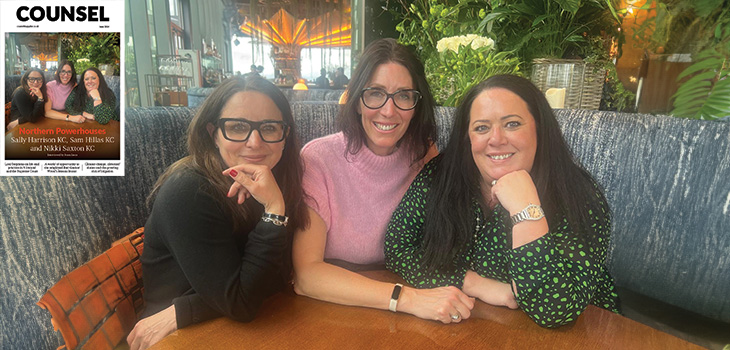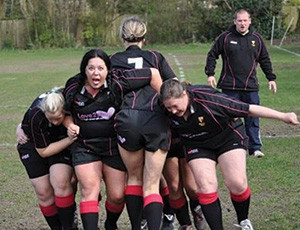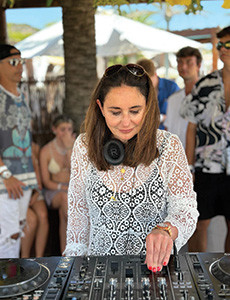*/

Jenna Lucas meets the financial remedy silks to find out how each forged their path to silk and brought led money work back to the Northern Bar – along with the responsibility that brings and the importance of a side hustle
I recently had the privilege of sitting down with Sally Harrison KC, Sam Hillas KC and Nikki Saxton KC who are, as far as we know, the only three financial remedy silks based in the North. As a junior barrister in Manchester, Sally recalls having to look to London for silks to lead her in the complex and high net worth work her solicitors sent to her: ‘At one time I was responsible for sending the majority of the led work outside London to the silks in one of the London sets.’ By 2010 she had taken silk – bringing the led money work back to the North.
Sam notes how the tables have turned and the Northern Bar now holds its own: ‘There appears to be a misconception that London is the centre of the legal universe and that those of us consigned to the provinces pick up the scraps, but as we demonstrate, the ‘‘Northern Powerhouse’’ is alive and kicking. There is certainly no shortage of the amount or variety of work around.’
It’s a misconception also, Sam says, that all your work will be on Circuit: ‘Most of my work is centred around Manchester, Liverpool and Cheshire, but I’m frequently in London and other courts around the country.’ This cuts both ways: ‘I’m just as frequently against London counsel in cases on the Northern Circuit and they make no secret of the fact it’s great work that they’re keen to do.’
What drew them to the Bar in the first place? It was at the age of 13 that Nikki decided she wanted to be a barrister. She graduated from Jesus College, Cambridge with a first in law before starting what was meant to be a criminal law pupillage. However, having turned up on her first day, Nikki’s pupil master (with whom she remains great friends) jokingly told her that he couldn’t have ‘a bird’ following him around all the time (was she perhaps a little too keen?). Instead, and to her good fortune, Nikki was kept busy by spending a large part of her pupillage shadowing a family practitioner with a public law children and ancillary relief (as it then was) practice. After a short stint in London during pupillage she returned home to chambers in Leeds as a tenant in 1993. Since 2012 Nikki has specialised in money work and in 2023 she took silk.
Sam is the daughter of a scrap metal dealer and admits that ‘becoming a barrister was not an obvious choice’. Despite doing a law degree and Bar finals, her route to the Bar was not straightforward. However, failing to secure pupillage after finishing Bar school in 1996 didn’t deter her. After numerous rounds of rejections, she cross-qualified as a solicitor and transferred back to the Bar after (‘finally!’) obtaining pupillage in 2003. The experience served her well and Sam soon became the go-to counsel for her hands-on and often blunt practical advice, taking silk in 2020.
Sally unintentionally followed her father, formerly a district judge, into a career in law. Her personal injury pupillage soon morphed into a family law practice, which is ‘just as well’, she says: ‘Sitting doing papers all day just wasn’t for me: I like being in court far too much.’ In any event, the clerks in her then chambers decided that she should start taking on returns from senior members of chambers: ‘I remember being instructed on an ex parte worldwide Mareva injunction and writ of ne exeat regno (as they used to be called!) before Hale J when I was about five minutes’ call.’
Our conversation returns to present day, and I ask if they think it is a coincidence that all of the money silks in the North are women? ‘That’s a difficult question to answer,’ Sam admits. While they all describe being a woman in a man’s world when they started to specialise in financial remedies work, none of them take the view that they felt disadvantaged for being women, but credit that with a sense of meritocracy they don’t see as often in London: ‘In the North, if you’re good enough, you’re encouraged to apply without thinking you have to somehow ‘‘wait your turn’’.’
This, of course, does present an additional challenge when applying for silk: ‘In the North we don’t have 10 silks in chambers to feed us the junior work which lends itself to silk applications’ says Nikki. She perceives, and Sam and Sally agree, that ‘building a portfolio for your silk application can take longer outside of London because opportunities to showcase your skills before High Court judges or other money silks will be fewer’. Sam recounts that one potential silk referee on the High Court bench couldn’t recall who she was, leading to a last-minute re-write of the form.
Sally’s silk application year was the first time candidates could name a district judge as an assessor. Historically, the inability to do so was almost certainly prejudicial when, ‘at that time in the North more of our district judges held on to complex money work’. They all agree also that a largely ADR- [alternative dispute resolution] based practice doesn’t necessarily lend itself well to the application form: this was ‘problematic’ given how important ADR is in the financial remedies sphere, although allowing applicants to use private FDR (financial dispute resolution) cases is a step forward.
I am curious to know whether, when building their junior practices as women, they felt they were operating in a man’s world, especially when it came to silk applications. When Nikki first applied for silk she was the only woman in a chambers of 44 tenants.
Sally recalls feeling invisible when pregnant: ‘You wouldn’t be instructed for a first appointment once they knew that you might not be around for the FDR.’ Her early days returning from maternity leave are something of a blur; she recalls being led by Nicholas Mostyn QC (as he then was), typing a chronology with one hand and rhythmically bouncing the baby chair with the other. ‘I would turn up at court desperate to prove I was every bit as good as I was pre-baby, even without any sleep.’ She hopes the fact she had to means the women coming behind her don’t have to.
When Nikki first applied for silk, in 2014, she was unsuccessful and did not bounce back quickly. She admits frankly: ‘I entered a decade-long sulk and said I would never apply again.’ They all reflect that women seem to take a different approach to silk and judicial applications: ‘The men will ‘‘reach’’ for it, whereas the women apply only when they think they’re 100% ready. The knockbacks are then harder to take.’
Nikki’s advice to others thinking of applying is to enter with your eyes wide open and your emotional regulation in check: ‘It is a rigorous and relentless process which will consume most of your waking moments for a prolonged period of time.’ Not least due to the ‘earache’ she received from Sally and Sam, she emerged from her sullen decennary and eventually re-applied in 2023; this time successfully.
Sam acknowledges she benefitted from ‘brilliant timing’, being a senior junior at the time when Sally’s silk practice was hitting heady heights: ‘I didn’t have to imagine what a Northern female silk smashing it in practice looked like.’ When Sam needed a leader on Gohil v Gohil in the Supreme Court in 2015, in contrast to Sally in her senior junior years, Sam looked no further than her own chambers: ‘There was never any question I would want any silk other than Sally to lead me.’ She also harangued Sally for junior briefs, and was prepared to act pro bono for the experience. In terms of other tips for silk, she suggests keeping a contemporaneous log of substantial cases and that ‘reading the criteria and reflecting on it well in advance of the year you plan to make the application will put you in the right mindset’.
All of them are clear that they will be staying put. Sally recalls being worried when people asked at her silks party, ‘When are you moving to London?’, but she was adamant she would stay in the North. She was true to her word and has never considered a move to the big smoke. History shows that she was right not to do so. It just wasn’t necessary.
As Sam says, ‘There are huge benefits to practising outside of London. My professional colleagues in London really miss out on Circuit life. I’m biased of course [Sam is the Attorney General of the Northern Circuit], but new pupils on Circuit really do feel like they’re joining a ‘‘family’’.’ Sam takes mentoring of aspiring barristers, pupils and junior members of the Bar not just seriously, but considers it a personal responsibility: ‘I want to be the person I wish I had in my life when I was trying to build a career as a barrister.’
Nikki recalls Sam impressing on her that ‘with those two coveted letters comes a huge responsibility, not only to the junior Bar, but also to younger kids who might feel a career at the Bar isn’t for them because they don’t go to the right school’.
As a fellow financial remedies practitioner, I cannot resist the urge to ask them what they see as the forthcoming changes in this area. They are unanimous that conduct in financial remedy proceedings is a tricky area they are not convinced we are currently getting right. This is an issue about which Sam has strong views: ‘I’m not as certain as others are that a quantifiable financial impact is necessary for conduct to be taken into account.’ Nikki points out the obvious risk of turning the financial remedies court into a court of morals, but they all agree that some financial cases involving the worst domestic abuse never see the inside of a courtroom, as Sally says ‘because the victims often throw in the towel long before the case gets to court’.
Their approaches and styles differ in life, much as they do at work. Sally favours intensive bursts of work followed by stints of self-discovery, such as learning to DJ in Ibiza (the musical, rather than judicial, variety), while Nikki has a side hustle with a doggy daycare and grooming business. Sam complains she is ‘very dull’ in comparison, but has managed to keep up her rugby by sitting as a judicial officer for the RFU and World Rugby and promising that she ‘hasn’t hung up [her] boots quite yet’.
What is clear is that the three doyennes of the North feel hugely indebted to those women who blazed the trail ahead of them, and a profound sense of duty to encourage those coming behind them. As Sally sums up: ‘It would be easy to forget that we are now the women at the Bar who we would have looked up to as juniors and with that comes responsibility.’




I recently had the privilege of sitting down with Sally Harrison KC, Sam Hillas KC and Nikki Saxton KC who are, as far as we know, the only three financial remedy silks based in the North. As a junior barrister in Manchester, Sally recalls having to look to London for silks to lead her in the complex and high net worth work her solicitors sent to her: ‘At one time I was responsible for sending the majority of the led work outside London to the silks in one of the London sets.’ By 2010 she had taken silk – bringing the led money work back to the North.
Sam notes how the tables have turned and the Northern Bar now holds its own: ‘There appears to be a misconception that London is the centre of the legal universe and that those of us consigned to the provinces pick up the scraps, but as we demonstrate, the ‘‘Northern Powerhouse’’ is alive and kicking. There is certainly no shortage of the amount or variety of work around.’
It’s a misconception also, Sam says, that all your work will be on Circuit: ‘Most of my work is centred around Manchester, Liverpool and Cheshire, but I’m frequently in London and other courts around the country.’ This cuts both ways: ‘I’m just as frequently against London counsel in cases on the Northern Circuit and they make no secret of the fact it’s great work that they’re keen to do.’
What drew them to the Bar in the first place? It was at the age of 13 that Nikki decided she wanted to be a barrister. She graduated from Jesus College, Cambridge with a first in law before starting what was meant to be a criminal law pupillage. However, having turned up on her first day, Nikki’s pupil master (with whom she remains great friends) jokingly told her that he couldn’t have ‘a bird’ following him around all the time (was she perhaps a little too keen?). Instead, and to her good fortune, Nikki was kept busy by spending a large part of her pupillage shadowing a family practitioner with a public law children and ancillary relief (as it then was) practice. After a short stint in London during pupillage she returned home to chambers in Leeds as a tenant in 1993. Since 2012 Nikki has specialised in money work and in 2023 she took silk.
Sam is the daughter of a scrap metal dealer and admits that ‘becoming a barrister was not an obvious choice’. Despite doing a law degree and Bar finals, her route to the Bar was not straightforward. However, failing to secure pupillage after finishing Bar school in 1996 didn’t deter her. After numerous rounds of rejections, she cross-qualified as a solicitor and transferred back to the Bar after (‘finally!’) obtaining pupillage in 2003. The experience served her well and Sam soon became the go-to counsel for her hands-on and often blunt practical advice, taking silk in 2020.
Sally unintentionally followed her father, formerly a district judge, into a career in law. Her personal injury pupillage soon morphed into a family law practice, which is ‘just as well’, she says: ‘Sitting doing papers all day just wasn’t for me: I like being in court far too much.’ In any event, the clerks in her then chambers decided that she should start taking on returns from senior members of chambers: ‘I remember being instructed on an ex parte worldwide Mareva injunction and writ of ne exeat regno (as they used to be called!) before Hale J when I was about five minutes’ call.’
Our conversation returns to present day, and I ask if they think it is a coincidence that all of the money silks in the North are women? ‘That’s a difficult question to answer,’ Sam admits. While they all describe being a woman in a man’s world when they started to specialise in financial remedies work, none of them take the view that they felt disadvantaged for being women, but credit that with a sense of meritocracy they don’t see as often in London: ‘In the North, if you’re good enough, you’re encouraged to apply without thinking you have to somehow ‘‘wait your turn’’.’
This, of course, does present an additional challenge when applying for silk: ‘In the North we don’t have 10 silks in chambers to feed us the junior work which lends itself to silk applications’ says Nikki. She perceives, and Sam and Sally agree, that ‘building a portfolio for your silk application can take longer outside of London because opportunities to showcase your skills before High Court judges or other money silks will be fewer’. Sam recounts that one potential silk referee on the High Court bench couldn’t recall who she was, leading to a last-minute re-write of the form.
Sally’s silk application year was the first time candidates could name a district judge as an assessor. Historically, the inability to do so was almost certainly prejudicial when, ‘at that time in the North more of our district judges held on to complex money work’. They all agree also that a largely ADR- [alternative dispute resolution] based practice doesn’t necessarily lend itself well to the application form: this was ‘problematic’ given how important ADR is in the financial remedies sphere, although allowing applicants to use private FDR (financial dispute resolution) cases is a step forward.
I am curious to know whether, when building their junior practices as women, they felt they were operating in a man’s world, especially when it came to silk applications. When Nikki first applied for silk she was the only woman in a chambers of 44 tenants.
Sally recalls feeling invisible when pregnant: ‘You wouldn’t be instructed for a first appointment once they knew that you might not be around for the FDR.’ Her early days returning from maternity leave are something of a blur; she recalls being led by Nicholas Mostyn QC (as he then was), typing a chronology with one hand and rhythmically bouncing the baby chair with the other. ‘I would turn up at court desperate to prove I was every bit as good as I was pre-baby, even without any sleep.’ She hopes the fact she had to means the women coming behind her don’t have to.
When Nikki first applied for silk, in 2014, she was unsuccessful and did not bounce back quickly. She admits frankly: ‘I entered a decade-long sulk and said I would never apply again.’ They all reflect that women seem to take a different approach to silk and judicial applications: ‘The men will ‘‘reach’’ for it, whereas the women apply only when they think they’re 100% ready. The knockbacks are then harder to take.’
Nikki’s advice to others thinking of applying is to enter with your eyes wide open and your emotional regulation in check: ‘It is a rigorous and relentless process which will consume most of your waking moments for a prolonged period of time.’ Not least due to the ‘earache’ she received from Sally and Sam, she emerged from her sullen decennary and eventually re-applied in 2023; this time successfully.
Sam acknowledges she benefitted from ‘brilliant timing’, being a senior junior at the time when Sally’s silk practice was hitting heady heights: ‘I didn’t have to imagine what a Northern female silk smashing it in practice looked like.’ When Sam needed a leader on Gohil v Gohil in the Supreme Court in 2015, in contrast to Sally in her senior junior years, Sam looked no further than her own chambers: ‘There was never any question I would want any silk other than Sally to lead me.’ She also harangued Sally for junior briefs, and was prepared to act pro bono for the experience. In terms of other tips for silk, she suggests keeping a contemporaneous log of substantial cases and that ‘reading the criteria and reflecting on it well in advance of the year you plan to make the application will put you in the right mindset’.
All of them are clear that they will be staying put. Sally recalls being worried when people asked at her silks party, ‘When are you moving to London?’, but she was adamant she would stay in the North. She was true to her word and has never considered a move to the big smoke. History shows that she was right not to do so. It just wasn’t necessary.
As Sam says, ‘There are huge benefits to practising outside of London. My professional colleagues in London really miss out on Circuit life. I’m biased of course [Sam is the Attorney General of the Northern Circuit], but new pupils on Circuit really do feel like they’re joining a ‘‘family’’.’ Sam takes mentoring of aspiring barristers, pupils and junior members of the Bar not just seriously, but considers it a personal responsibility: ‘I want to be the person I wish I had in my life when I was trying to build a career as a barrister.’
Nikki recalls Sam impressing on her that ‘with those two coveted letters comes a huge responsibility, not only to the junior Bar, but also to younger kids who might feel a career at the Bar isn’t for them because they don’t go to the right school’.
As a fellow financial remedies practitioner, I cannot resist the urge to ask them what they see as the forthcoming changes in this area. They are unanimous that conduct in financial remedy proceedings is a tricky area they are not convinced we are currently getting right. This is an issue about which Sam has strong views: ‘I’m not as certain as others are that a quantifiable financial impact is necessary for conduct to be taken into account.’ Nikki points out the obvious risk of turning the financial remedies court into a court of morals, but they all agree that some financial cases involving the worst domestic abuse never see the inside of a courtroom, as Sally says ‘because the victims often throw in the towel long before the case gets to court’.
Their approaches and styles differ in life, much as they do at work. Sally favours intensive bursts of work followed by stints of self-discovery, such as learning to DJ in Ibiza (the musical, rather than judicial, variety), while Nikki has a side hustle with a doggy daycare and grooming business. Sam complains she is ‘very dull’ in comparison, but has managed to keep up her rugby by sitting as a judicial officer for the RFU and World Rugby and promising that she ‘hasn’t hung up [her] boots quite yet’.
What is clear is that the three doyennes of the North feel hugely indebted to those women who blazed the trail ahead of them, and a profound sense of duty to encourage those coming behind them. As Sally sums up: ‘It would be easy to forget that we are now the women at the Bar who we would have looked up to as juniors and with that comes responsibility.’



Jenna Lucas meets the financial remedy silks to find out how each forged their path to silk and brought led money work back to the Northern Bar – along with the responsibility that brings and the importance of a side hustle


The Chair of the Bar sets out how the new government can restore the justice system
In the first of a new series, Louise Crush of Westgate Wealth considers the fundamental need for financial protection
Unlocking your aged debt to fund your tax in one easy step. By Philip N Bristow
Possibly, but many barristers are glad he did…
Mental health charity Mind BWW has received a £500 donation from drug, alcohol and DNA testing laboratory, AlphaBiolabs as part of its Giving Back campaign
The Institute of Neurotechnology & Law is thrilled to announce its inaugural essay competition
How to navigate open source evidence in an era of deepfakes. By Professor Yvonne McDermott Rees and Professor Alexa Koenig
Brie Stevens-Hoare KC and Lyndsey de Mestre KC take a look at the difficulties women encounter during the menopause, and offer some practical tips for individuals and chambers to make things easier
Sir Geoffrey Vos, Master of the Rolls and Head of Civil Justice since January 2021, is well known for his passion for access to justice and all things digital. Perhaps less widely known is the driven personality and wanderlust that lies behind this, as Anthony Inglese CB discovers
The Chair of the Bar sets out how the new government can restore the justice system
No-one should have to live in sub-standard accommodation, says Antony Hodari Solicitors. We are tackling the problem of bad housing with a two-pronged approach and act on behalf of tenants in both the civil and criminal courts